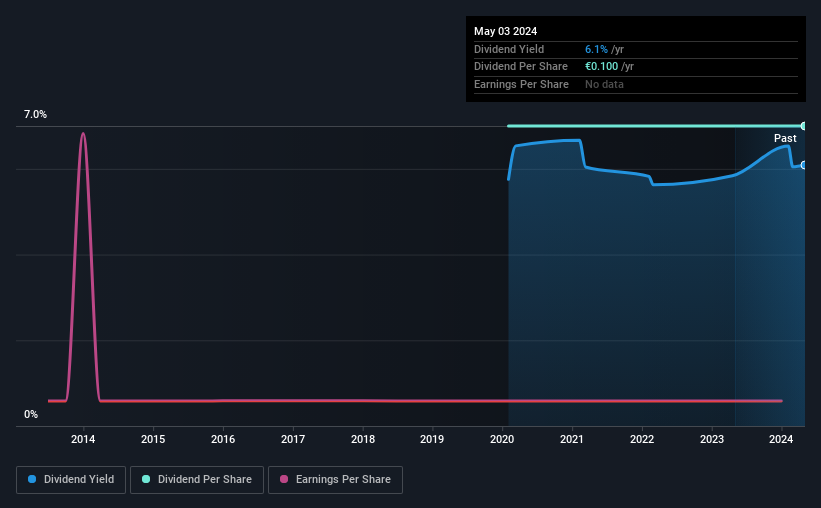
The board of Akelius Residential Property AB (publ) (STO:AKEL D) has announced that it will pay a dividend on the 12th of August, with investors receiving €0.025 per share. Based on this payment, the dividend yield on the company's stock will be 6.1%, which is an attractive boost to shareholder returns.
View our latest analysis for Akelius Residential Property
Akelius Residential Property Might Find It Hard To Continue The Dividend
We like to see robust dividend yields, but that doesn't matter if the payment isn't sustainable. The company is paying out a large amount of its cash flows, even though it isn't generating any profit. This is quite a strong warning sign that the dividend may not be sustainable.
Over the next year, EPS might fall by 67.3% based on recent performance. This means the company won't be turning a profit, which could place managers in the tough spot of having to choose between suspending the dividend or putting more pressure on the balance sheet.

Akelius Residential Property Is Still Building Its Track Record
The company has maintained a consistent dividend for a few years now, but we would like to see a longer track record before relying on it. The most recent annual payment of €0.10 is about the same as the annual payment 4 years ago. Modest dividend growth is good to see, especially with the payments being relatively stable. However, the payment history is relatively short and we wouldn't want to rely on this dividend too much.
Dividend Growth Potential Is Shaky
Some investors will be chomping at the bit to buy some of the company's stock based on its dividend history. Unfortunately things aren't as good as they seem. Akelius Residential Property's EPS has fallen by approximately 67% per year during the past five years. A sharp decline in earnings per share is not great from from a dividend perspective. Even conservative payout ratios can come under pressure if earnings fall far enough.
Akelius Residential Property's Dividend Doesn't Look Great
Overall, this isn't a great candidate as an income investment, even though the dividend was stable this year. The company isn't making enough to be paying as much as it is, and the other factors don't look particularly promising either. Considering all of these factors, we wouldn't rely on this dividend if we wanted to live on the income.
It's important to note that companies having a consistent dividend policy will generate greater investor confidence than those having an erratic one. Meanwhile, despite the importance of dividend payments, they are not the only factors our readers should know when assessing a company. For example, we've picked out 3 warning signs for Akelius Residential Property that investors should know about before committing capital to this stock. If you are a dividend investor, you might also want to look at our curated list of high yield dividend stocks.
New: Manage All Your Stock Portfolios in One Place
We've created the ultimate portfolio companion for stock investors, and it's free.
• Connect an unlimited number of Portfolios and see your total in one currency
• Be alerted to new Warning Signs or Risks via email or mobile
• Track the Fair Value of your stocks
Have feedback on this article? Concerned about the content? Get in touch with us directly. Alternatively, email editorial-team (at) simplywallst.com.
This article by Simply Wall St is general in nature. We provide commentary based on historical data and analyst forecasts only using an unbiased methodology and our articles are not intended to be financial advice. It does not constitute a recommendation to buy or sell any stock, and does not take account of your objectives, or your financial situation. We aim to bring you long-term focused analysis driven by fundamental data. Note that our analysis may not factor in the latest price-sensitive company announcements or qualitative material. Simply Wall St has no position in any stocks mentioned.
About OM:AKEL D
Akelius Residential Property
Through its subsidiaries, owns, manages, rents, restores, and upgrades residential properties in the United States, Canada, and Europe.
Low with imperfect balance sheet.


